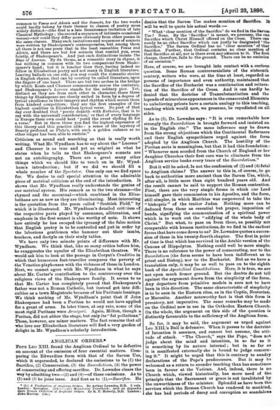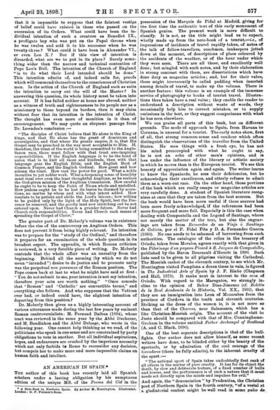ANGLICAN ORDERS.*
POPE LEO XIII. found the Anglican Ordinal to be defective on account of the omission of four essential matters. Com- paring the Edwardine form with that of the Sarum Use, which it superseded, be declared the omissions to be (1) the Sacrifice, (2) Consecration, (3) the Sacerdotium, (4) the power of consecrating and offering sacrifice. Dr. Lowndes clears the way by admitting two—(2) and (4)—of these omissions. As to (1) and (3) he joins issue. And first as to (1),—Sacrifice. He • 0.) A Vindication of Anglican Orders. By Arthur Lowndee. D.D. 2 vols. Lou on: Rivinwton. I3!e.1—(2.) Miniabrial Priesthood with an Appendix upon Ronson Criticism of Anglican Orders. By R. E. Moberly, D.D. London: John Murray. 114E1
denies that the Sarum Use makes mention of Sacrifice. It will be well to quote his actual words :-
"What ' clear mention of the Sacrifice' do we find in the Sarum, Use? None. By the Sacrifice' is meant, we presume, the one Sacrifice which Christ Himself offered on the Cross. There can surely be no other Sacrifice which can justly be designated ' the Sacrifice.' The Sarum Ordinal has no ' clear mention' of that Sacrifice. Further, that Ordinal contains no clear mention of that Sacrifice at all, nor is there even any allusion to it. The first charge, therefore, falls to the ground. There can be no omission of an omission."
Here, of coarse, we are brought into contact with a curious. question. Some Roman controversialists of the sixteenth century, writers who were, at the time at least, regarded as persons of importance and even authority, maintained that the Sacrifice of the Eucharist was a continuation and reitera- tion of the Sacrifice of the Cross. And it can hardly be-
denied that the doctrine of Transubstantiation and the legends of miraculous appearances in the consecrated Elements
to unbelieving priests have a certain analogy to this teaching, teaching which would now, we presume, be repudiated on all• sides.
As to (3), Dr. Lowndes says : " It is even remarkable how strongly the Sacerdotium is brought forward and insisted on in the English rite." The same inference may be drawn
from the strong objections which the Continental Reformers and their English sympathisers urged against the form adopted by the Anglican Church. The hostility of the Puritan sects is meaningless, but that it had this foundation :- " Whenever men seceded from the Church of England or her daughter Churches their first care was to eliminate from the Anglican service books every trace of the Sacerdotium."
But it will be asked, Is not the confession of (2) and (4) fatal to Anglican claims ? The answer to this is, of course,,to go. back to authorities more ancient than the Sarum Use, which,.
after all, is little more than eight hundred years old.. And the result cannot be said to support the Roman contention.
First, there are the very simple forms in which our Lord himself gave their commission to his Apostles, and the form,.
still simpler, in which Matthias was empowered to take the " bishopric " of the traitor Judas. Nothing more can be deduced from these as essential but prayer, imposition of hands, signifying the communication of a spiritual power which is to work out the "edifying of the whole body of Christ." But what, to pass on from these, as possibly not comparable with human institutions, do we find in the earliest forms that have come down to us? Dr. Lowndes quotes a succes- sion of these in his twenty-fourth chapter. The first in point of time is that which has survived in the Arabic version 9f the Canons of Hippolytus. Nothing could well be more simple. There is no reference to the power of consecrating, nor to the- Sacerdotium (the form seems to have been indifferent as to priest and Bishop), nor to the Eucharist. Bat as we have ar translation only, it may be as well to pass on to the eighth book of the Apostolical Constitutions. Here, it is true, we are not upon much firmer ground. Bat the doubts do not tell against the argument drawn from the simplicity of the form..
Any departure from primitive models is sure not to have been in this direction. The same characteristic of simplicity is to be seen in the Eastern rites, as in the Coptic, Nestorian', or Maronite. Another noteworthy fact is that this form is precatory, not imperative. The same remarks may be made on the Ordinal now in use in the Orthodox Eastern Church. On the whole, the argument on this side of the question is distinctly favourable to the sufficiency of the Anglican form.
So far, it may be said, the argument as urged against Leo XIIL's Bull is defensive. When it passes to the doctrine of Intention it assumes, and cannot but assume, the atti- tude of attack. "The Church," says the Pope, "does not
judge about the mind and intention, in so far as it is something by its nature internal ; but in so far as
it is manifested externally she is bound to judge concern- ing it." It might be urged that this is contrary to sundry declarations of the Pope's predecessors. But it may bs welcomed as a return to sounder teaching than has sometimes been in favour at the Vatican. And, indeed, there is no Church which, viewed historically, has more need of the principle that the Sacrament or grace is not invalidated by the unworthiness of the minister. Splendid as have been the services which the Roman Church has rendered to mankind, she has had periods of decay and corruption so scandalous that it is impossible to suppose that the faintest vestige of belief could have existed in those who passed on the
succession of its Orders. What could have been the in- dividual intention of such a creature as Benedict IX., a profligate boy who was put on the Papal throne when he was twelve and sold it to his successor when he was
twenty-three ? What could it have been in Alexander VI., or even Leo X. ? But if this view of intention is discarded, what are we to put in its place ? Surely some- thing wider than the narrow and technical contention of Pope Leo's Bull. The intention of the Church of England "is to do what their Lord intended should be done." This intention admits of, and indeed calls for, proofs which will commend themselves to the consciences of Christian men. Is the action of the Church of England such as suits the intention to carry out the will of the Master ? In answering this question, its whole history must be taken into account. If it has failed neither at home nor abroad, neither as a witness of truth and righteousness to its people nor as a missionary to those beyond its borders, then it may claim without fear that its intention is the intention of Christ. The thought has even more of monition in it than of encouragement. We may quote an eloquent passage from Dr. Lowndes's conclusion :-
" The disciples of Christ believe that He alone is the King of kings, and that He alone has the grant of dominions and sovereignties, and that where He grants empire, it is, that His Gospel may be preached in the way most acceptable to Him. If, therefore, the trust of the world is being committed to the Anglo- Saxon race, there must follow with that trust awe-inspiring responsibilities. If the English language is to be the bond of union that is to knit all races and kindreds, then with that language goes the English Bible, and the English Book of Common Prayer, and the English Ordinal. How great and how solemn the trust. How vast the power for good. What a noble incentive to yet nobler work. What a deepening sense of humility must steal over even the least thoughtful Anglican, as he realises the God-given mission of the Anglican Communion. How careful he ought to be to keep the Faith of Niema whole and undefiled. How jealous ought he to be lest its lustre be dimmed by accre- tions, no matter by whom and with what intent added. How resolute to be patient and abide the Lord's leisure ; how willing to be guided only by the light of the Holy Spirit, lest the Pre- sence be removed, and the goodly land now stretching out be not entered upon. Never had Church a grander future. Never had Church such responsibilities. Never had Church such means of spreading the Gospel of Christ."
The greater part of Dr. Moberly's volume was in existence
before the rise of the controversy on Anglican Orders. This does not prevent it from being highly relevant. Its intention was to prepare for the " study of the Ordinal," and therefore it prepares for an examination of the whole question in its broadest aspect. The appendix, in which Roman criticism is reviewed, is a very forcible piece of writing. Dr. Moberly contends that the whole affair was an unreality from the beginning. Behind all the seeming (by which we do not mean "intended ") desire to do justice and to promote unity was the perpetual non possumus of the Roman position. The Pope comes back at last to what he might have said at first : You do not submit to me, your intention is not my intention, therefore your acts are worth nothing." "Once concede that Roman' and ' Catholic' are convertible terms," and everything else follows. And who supposes that the Vatican ever had, or indeed could have, the slightest intention of departing from this position ?
Dr. Moberly then gives us a highly interesting account of various utterances made during the last few years by eminent Roman controversialists : M. Fernand Dalbus (1894), whose tract was reviewed in the same year by the Abbe Duchesne, and M. Boudinhon and the Abbe Delasge, who wrote in the following year. One cannot help thinking as we read, of the
politicians who speak in one sense and are constrained by party obligations to vote in another. But all individual aspirations, hopes, and endeavours are crushed by the imperious necessity which not only forbids to Rome to reconsider any decision, but compels her to make more and more impossible claims on
human faith and intellect.



































 Previous page
Previous page